Finding the right builder in the Dubbo region isn’t just about getting the job done; it’s about making sure your rural or regional project succeeds without logistical nightmares. One of the biggest hurdles we see is simply getting materials out to remote properties. That's precisely why we invested in our own 10-tonne 4×4 truck—to bring in labour and materials to even the most remote properties across New South Wales, getting supplies and our crew exactly where they’re needed, when they're needed most.
Your Guide to Building Projects in the Dubbo Region
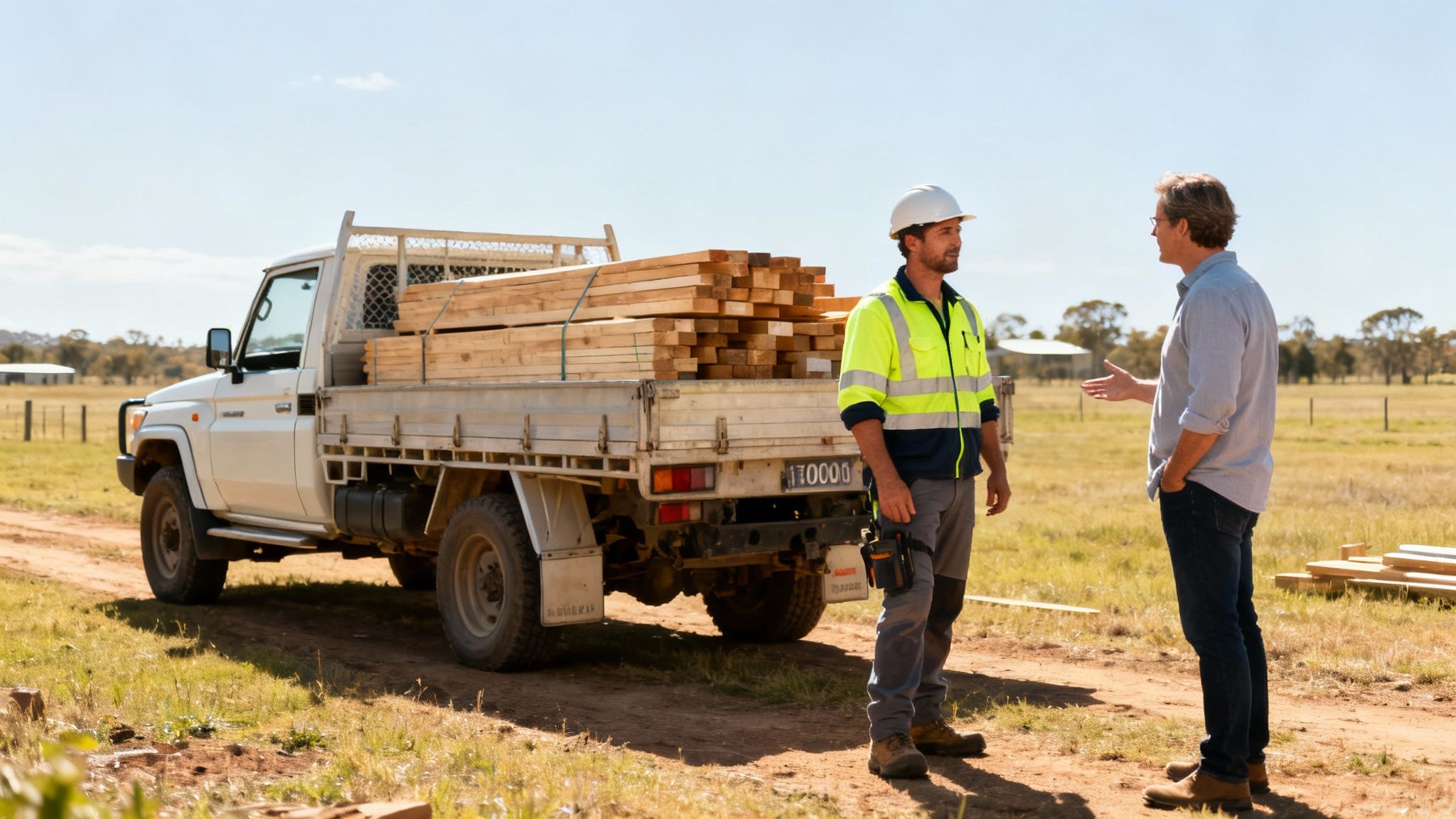
Starting any building project around Dubbo, whether it’s a beautiful custom homestead, a practical farm shed, or essential insurance repairs, comes with its own unique set of challenges and rewards. The entire area is buzzing with activity, reflecting just how much the region is growing.
This isn't just a feeling in the air; the numbers tell the same story. In the 2024-25 financial year, building approvals in the Dubbo Regional Council area rocketed to around $312.155 million. A huge 60.7% of that came from residential projects, which shows just how strong the demand for quality homes is. With 462 new dwellings approved—the most in over ten years—it's clear that finding a reliable, experienced builder has never been more critical. You can dig into these trends yourself on the Remplan economic insights portal.
Navigating the Local Building Scene
First things first: you have to understand the local landscape. Putting up a new building on a rural block is a world away from a standard suburban project. It requires a specific kind of know-how that only comes from hands-on experience in the region.
Here are a few things you absolutely need to think about:
- Site Accessibility: Can a standard delivery truck even get to your site? We often encounter unsealed roads, tight turns, or creek crossings that stop a normal vehicle in its tracks.
- Logistical Planning: How will everything be coordinated? Getting materials, supplies, and tradespeople to your property efficiently is key to avoiding expensive delays.
- Local Compliance: Are you and your builder up to speed with the Dubbo Regional Council’s requirements, specific zoning laws, and any environmental regulations that might apply?
The single most important decision you'll make is picking a building partner who genuinely gets these complexities. Someone with a proven track record in regional NSW can spot potential problems long before they happen, keeping your project running smoothly from day one. For a more detailed look, our guide on how to choose a builder walks you through a complete checklist.
Ultimately, the success of your project comes down to choosing a builder who brings more than just tools and skills. You need a team with the right logistical muscle to handle the unique challenges of building in and around Dubbo. We always inform our clients that we have a 10-tonne 4×4 truck specifically for this purpose, allowing us to bring in labour and materials where and when they're needed most, even on the most remote properties in New South Wales.
So, you’re ready to get serious about a builder in Dubbo? Before you let anyone set foot on your property, let alone sign a contract, there’s some essential homework to do. Think of this as your first and most important line of defence against shoddy work, project delays, and financial disaster.
The good news is, checking a builder’s credentials in NSW is easier than you might think.
Licence Check: The Non-Negotiable First Step
First things first, let's talk licences. In New South Wales, any residential building work valued at over $5,000 legally requires the builder to hold a valid licence. This isn't just a piece of paper; it's proof they've met the state's standards for skill and professionalism.
You can instantly verify any builder’s status using the Service NSW public register. It’s a free, official tool that lets you punch in a name or licence number. In seconds, you’ll see if their licence is active, check their history, and, crucially, find out about any disciplinary actions against them. Don't skip this.
When you look them up, you’ll see a couple of different licence types. Here’s what they mean for your project:
- Contractor Licence: This is the business licence. It’s what allows a company or a sole trader to enter into a contract with you and take on the job.
- Supervisor Certificate: This is held by the person on the ground with the technical skills to actually supervise the work.
The business you hire must have a Contractor Licence for the specific type of work you need. A builder might hold both, or a larger company will have a Contractor Licence and employ supervisors who hold the certificate.
Verifying these details isn't just about ticking boxes. It’s about securing your peace of mind and protecting your investment. You're ensuring the person building your home, shed, or extension has been officially vetted by the state.
Don’t Be Shy: Ask for Proof of Insurance
Next up is insurance. Any legitimate builder will have this sorted and won't hesitate to show you the proof. Don't just take their word for it—ask to see their current certificates of currency.
You’re looking for two key things here: Public Liability Insurance, which covers accidental damage to property or injury to others, and Workers Compensation Insurance, which covers their team if they get hurt on your site.
But there's one more piece of insurance that’s absolutely critical for homeowners in NSW. It’s called the Home Building Compensation Fund (HBCF), which you might hear referred to as home warranty insurance.
For most residential projects over $20,000, this insurance is mandatory. It's your safety net. It protects you from financial loss if your builder dies, disappears, or goes broke, leaving your project unfinished or full of defects.
Your builder must give you an HBCF certificate for your specific project before they can legally take a deposit or start any work. If a builder fumbles this or gives you excuses, consider it a giant red flag and walk away.
To make this easier, here’s a quick checklist you can use when vetting any builder.
Essential Builder Credentials Checklist
Before you commit, run every potential builder through this checklist. A professional will have all this ready to go.
| Credential Check | What to Look For | Why It's Critical |
|---|---|---|
| Contractor Licence | Active status on the Service NSW register. No disciplinary actions. | Confirms they are legally allowed to contract for building work over $5,000 in NSW. |
| Public Liability Insurance | A current Certificate of Currency. Check the expiry date and coverage amount. | Protects you from liability if an accident causes damage to your neighbour's property or injures a third party. |
| Workers Compensation | A current Certificate of Currency. | Ensures the builder's employees are covered for injury, protecting you from potential claims. |
| HBCF Insurance | A certificate for projects over $20,000. It must be specific to your property and project. | Your financial safety net against an insolvent, missing, or deceased builder. It's a legal requirement. |
Taking a few minutes to verify these documents upfront can save you from months, or even years, of headaches down the track. It’s the smartest move you can make before breaking ground.
Navigating Dubbo Council Permits and Approvals
Getting your project through the local council is one of the biggest hurdles in any build. Get it wrong, and you're looking at frustrating delays and unexpected costs. In the Dubbo region, this means dealing with the Dubbo Regional Council and making sure every 'i' is dotted and 't' is crossed long before anyone breaks ground.
This isn't just about filling out forms. It’s a critical step to ensure your build is safe, compliant with local planning laws, and a good fit for its surroundings. Trying to go it alone can feel like navigating a maze blindfolded. This is where having a local builder who knows the system inside and out becomes a massive advantage.
Development Application vs. Complying Development
In NSW, there are two main paths to getting your project off the ground. The right one for you really depends on the scale and complexity of what you're planning to build.
-
Development Application (DA): This is the traditional, more detailed process. You'll almost certainly need a DA for a new rural homestead, a large-scale commercial shed, or any project that's a bit out of the ordinary. The council will do a thorough assessment, looking at everything from environmental impact to how it fits in with the local area.
-
Complying Development Certificate (CDC): This is the fast-track option for more straightforward jobs. Think of a standard farm shed on a large block or a simple extension that fits within a set of pre-defined rules. If your project meets all the criteria under the relevant State Environmental Planning Policy, a private certifier can give it the green light, bypassing a full council review.
For instance, a new machinery shed on a back paddock might be a perfect candidate for a CDC, provided it meets the specific size, height, and setback rules. But if you're building a unique architect-designed home on a block with heritage or environmental restrictions, a full DA is unavoidable.
Want to dig a bit deeper? We've put together a handy guide on whether you need council approval for a shed.
The infographic below shows the very first steps you should take when vetting a builder—long before you even start thinking about permits.
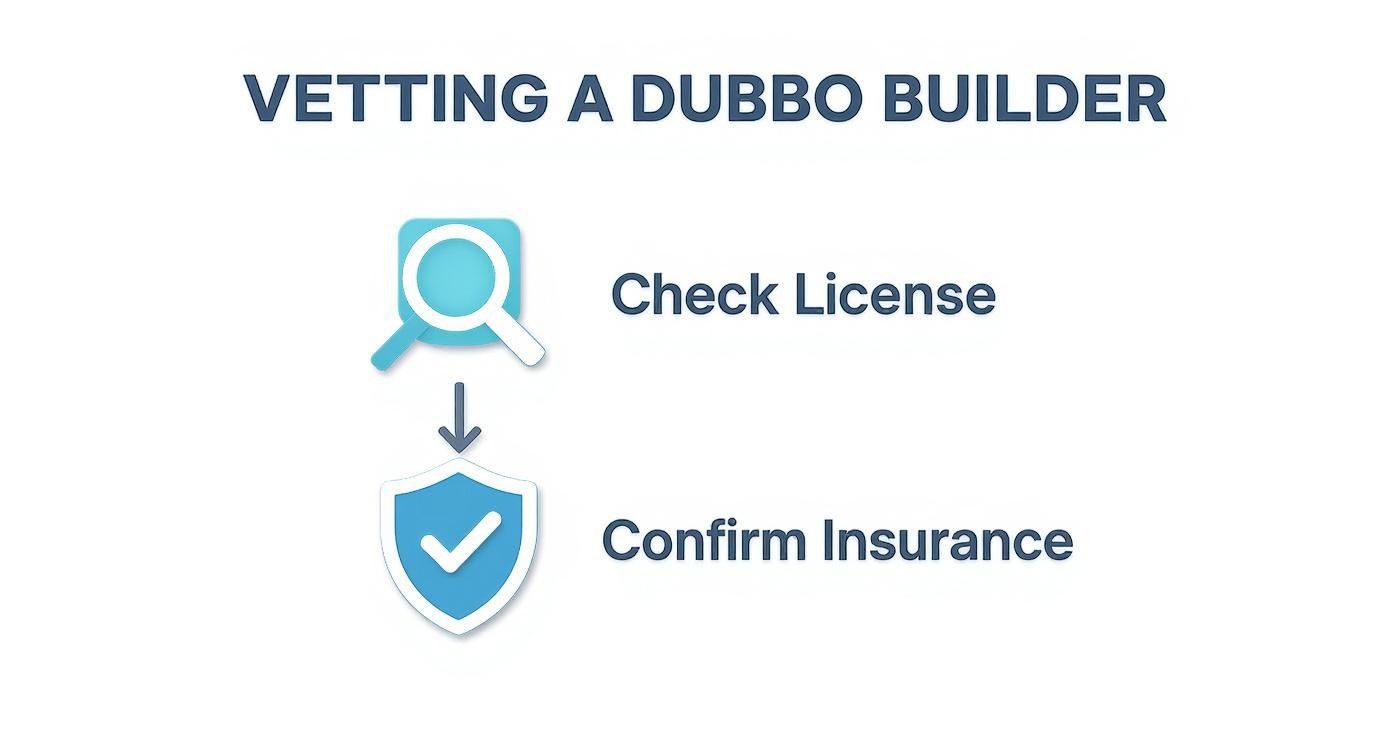
As you can see, checking the fundamentals like licences and insurance is non-negotiable. It's the foundation of a trustworthy partnership.
Key Local Factors to Consider
Beyond just choosing between a DA and a CDC, there are plenty of local Dubbo-specific rules that can impact your project. A builder worth their salt will know these like the back of their hand.
You'll need to think about things like zoning rules, which determine what type of building is allowed on your land. Another big one out here is the Bushfire Attack Level (BAL) assessment. If your property is in a designated bushfire-prone area, your BAL rating will dictate the specific materials and building methods needed to keep your home safe.
Honestly, managing these local regulations is half the battle. A builder with genuine local experience knows exactly what documentation the council needs and how to present it, saving you from the headache of costly delays or a flat-out rejection.
This local expertise is even more vital for properties off the beaten track. Simply getting surveyors, certifiers, and supplies to a remote site is a major logistical challenge. That’s why we run a 10-tonne 4×4 truck, giving us the capability to haul our team and materials to even the most isolated properties across New South Wales. It ensures your project gets what it needs to meet all compliance standards, no matter how far out you are.
Getting a Handle on Costs and Timelines
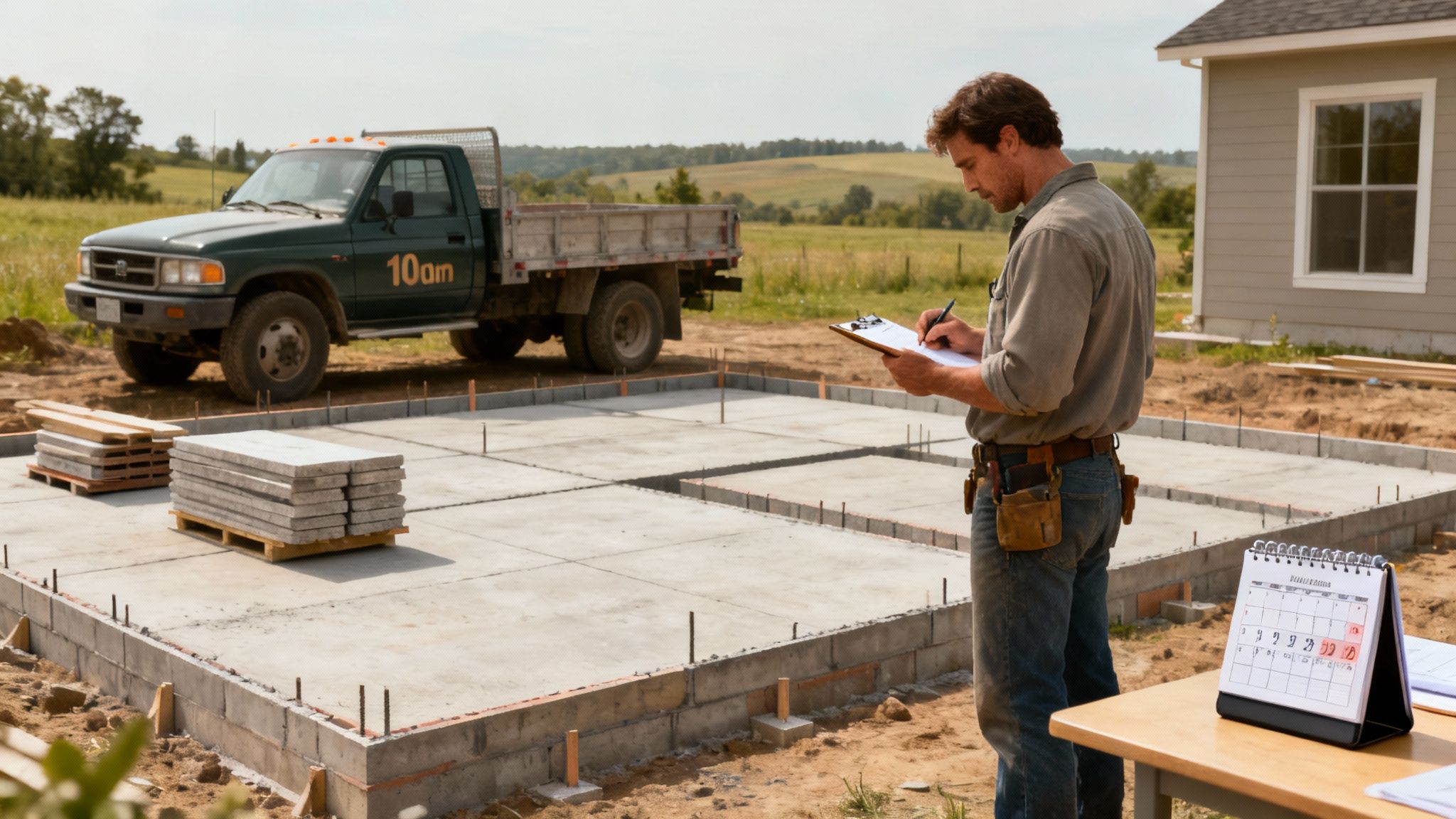
Let's cut to the chase—the most daunting part of any build is usually the budget and the schedule. When you bring a builder on board, getting a firm grip on what actually drives the final cost is the key to a good working relationship and a project that stays on track.
The price of a rural build is so much more than just a simple square-metre rate. The true cost is a mix of your material choices, local labour rates, how tricky your site is to work on, and plain old logistics. A straightforward steel shed on a flat, easy-to-reach block is a world away from a custom homestead on a sloping, remote property needing major earthworks.
What Really Moves the Needle on Price
The final quote you get should be a detailed breakdown, but it helps to know what you’re looking at from the very beginning. A good builder will walk you through it, but here are the main things that will influence the numbers.
- Your Choice of Materials: Opting for high-end finishes, imported stone, or specialised cladding will naturally cost more than standard, locally available materials.
- Site Accessibility: This is a big one out here. How easy is it to get machinery, trades, and materials onto your property? Rough tracks, creek crossings, or just being a long way out of town all add time and money to the job.
- The Complexity of the Design: An architecturally ambitious home with unique angles and custom features demands more skilled labour and takes longer to build than a simple rectangular design.
- Current Market Conditions: The availability of good tradespeople and the fluctuating price of materials can have a real impact on the final budget.
A factor people often forget is the builder's own logistical setup. I’ve seen projects delayed and budgets blown out simply because a supplier couldn’t get their truck down a muddy track. This is where having the right equipment and a solid plan makes a massive difference.
You can see this playing out in the wider industry stats. Nationally, while residential building approvals went up by 12.0% in September 2025, the number of new houses actually starting construction dropped by 6.6%. That gap often comes down to things like labour shortages and supply chain headaches, which just goes to show how crucial a builder's logistical management really is.
The Rural Logistics Edge
For anyone on a property around Dubbo, logistics are make-or-break. A project can be perfectly planned on paper, but if the materials don’t show up, everything grinds to a halt. It’s a common headache in regional NSW, where you can’t always count on third-party transport.
That’s exactly why we run our own 10-tonne 4×4 truck. It means we can get materials, supplies, and our labour force directly to even the most remote sites across New South Wales. This control over our own transport lets us get the job done when and where it's needed most, keeping the project moving and avoiding costly delays.
Nailing Down a Realistic Estimate
For something like a typical three-bedroom rural homestead, the costs can vary hugely depending on all the factors we’ve talked about. But every successful project begins with a detailed and transparent quote.
If you want to get a clearer idea of the potential costs for your build, our guide can help you estimate house construction costs. It's a great resource for understanding all the moving parts, so you can have a much more productive conversation with your builder from day one.
Key Questions to Ask Your Potential Builder
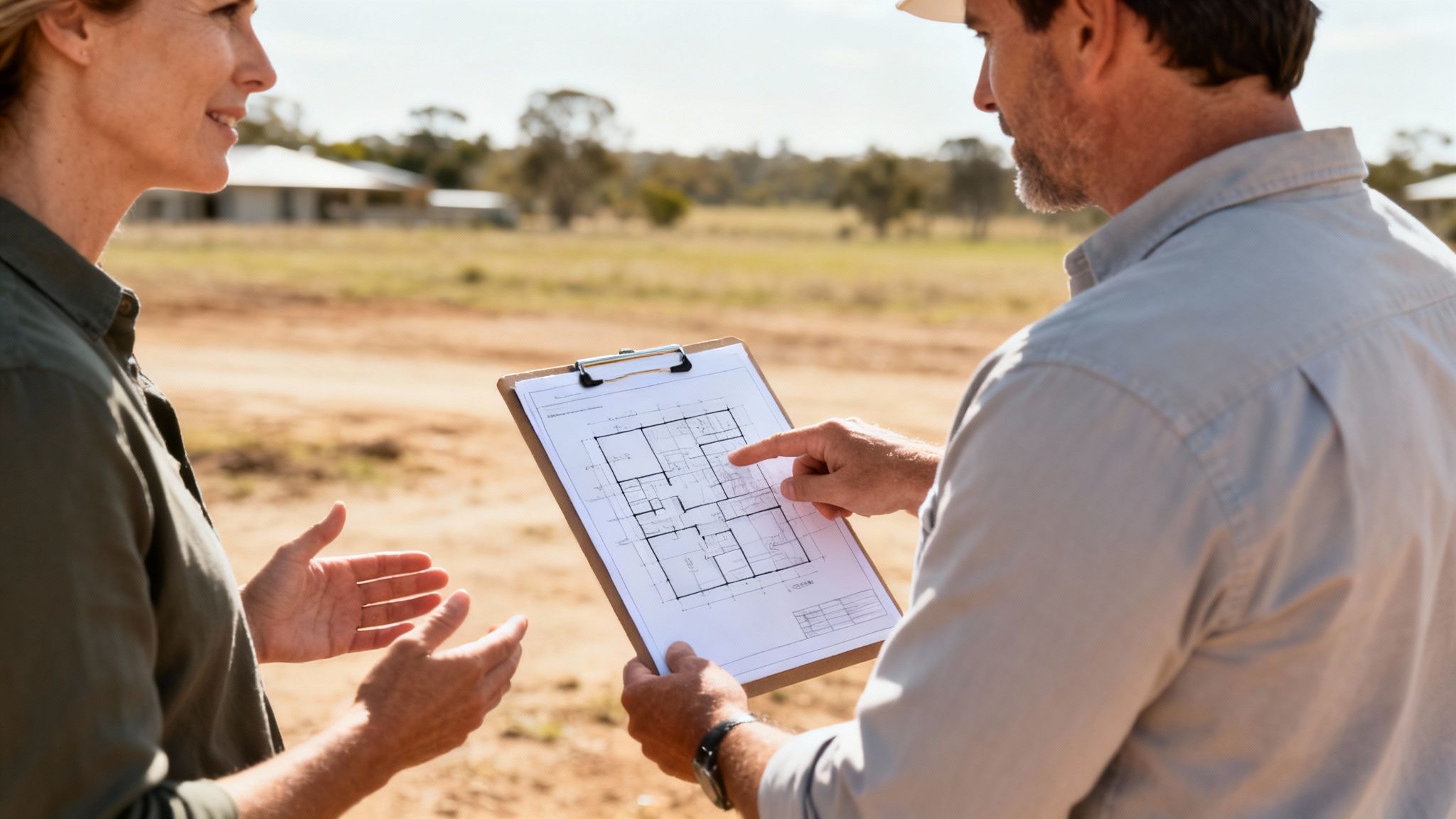
Alright, you’ve done the essential checks. You've confirmed their licence is active and they have the right insurance. But the paperwork is just the starting line. Now it’s time for a proper conversation to see if they’re truly the right fit for your project and, just as importantly, for you.
This chat is your chance to get a real feel for their experience, how they communicate, and how they handle problems when they inevitably crop up. Finding the right builder in Dubbo is about finding a partner you can trust, especially when you’re building out on a rural block. A vague answer to a tough question now can easily become a massive headache down the track. Don't hold back—a true professional will appreciate your diligence.
Questions About Rural Project Experience
Building in regional NSW comes with its own set of rules and challenges that someone used to city jobs might completely overlook. Your questions need to get right to the heart of their experience with the realities of rural construction.
Kick things off by asking to see their work. A simple, "Could you show me a few homesteads or sheds you've built on properties like mine around the region?" will tell you a lot. It’s not just about seeing the finished product; it’s about confirming they understand the local landscape and building styles.
Here are a few more specific questions I’d recommend asking:
- Logistics and Site Access: "How do you plan on getting materials out to our property? We’ve got a long unsealed driveway and a creek crossing that can be tricky after rain."
- Their Local Team: "Who are your go-to local tradies for things like plumbing, electrical, and earthworks? How long have you been working with them?"
- Real-World Problem-Solving: "Tell me about a time a rural job went sideways—maybe a supply delay or a freak storm. How did you get it back on track?"
Their answers here are incredibly revealing. You’ll quickly get a sense of whether they’ve just 'done a few jobs out of town' or if they genuinely have the experience and systems to handle whatever your property throws at them.
We’ve learned from experience that getting materials and a skilled team to a remote site is half the battle. That's precisely why we invested in a 10-tonne 4×4 truck. It lets us bring in labour and materials where and when they're needed most, allowing us to get everything—and everyone—we need to even the most isolated properties across New South Wales. It means we’re not at the mercy of standard delivery services and can keep the project moving.
Understanding Their Process and Communication
A smooth build is built on a foundation of clear, consistent communication. You need to know exactly how they operate and how you’ll be kept in the loop from start to finish. If their process sounds fuzzy, that's a major red flag.
Ask them to walk you through their entire process. How does it work from the first site meeting all the way to handing over the keys? Who will be your main point of contact, and how often can you expect to hear from them? A builder who prioritises transparency will have this all mapped out.
Trust your gut. If someone seems cagey about setting up a communication schedule or brushes off your concerns, it’s a sign of what’s to come. This is your project and your money; you deserve to be kept informed every step of the way.
Common Questions About Building in Dubbo
When you're looking to build on a rural or regional property, you're bound to have questions. It’s a big undertaking. To give you some clarity, we’ve put together straightforward answers to the things we get asked most often by property owners just like you.
What Kind of Projects Are Your Bread and Butter?
We've built our reputation on handling the specific challenges of rural and regional construction. Our team specialises in building custom new homesteads from the dirt up and erecting tough, Australian-made farm sheds and workshops that can stand up to anything the local climate throws at them.
Beyond new builds, we're also the team people call for major extensions, renovations, and tricky insurance repair work. When you're dealing with the aftermath of a storm, fire, or flood, you need a builder who knows how to navigate the process and get your property back to its best.
How Does Your 4×4 Truck Actually Help My Build?
This is a great question because it highlights a very real problem. On remote properties, logistics can make or break a project's timeline and budget. We've all seen it: a standard delivery truck can't get down an unsealed road or cross a creek after a bit of rain, and suddenly, the whole job grinds to a halt.
That’s exactly why we invested in our own 10-tonne 4×4 all-terrain truck. Think of it as our mobile solution to the logistical headaches of remote building. It allows us to haul all the materials, supplies, and even our crew directly to your site, no matter how rough the track is. We can bring in labour and materials where and when it’s needed the most on remote properties across New South Wales.
This isn't just a convenience; it's a core part of how we keep projects on track. We aren't at the mercy of third-party couriers who might not service your area or turn back at the first sign of a muddy road. We get what's needed, where it's needed, when it's needed.
What Should I Look for in a Professional Quote?
A proper quote from a builder should be a lot more than just a final number scribbled on a page. Vague quotes are a huge red flag. You need a detailed, transparent document that leaves no room for confusion.
A good quote will always break down the following:
- A clear itemisation of costs for labour, materials, and any council permits.
- Details on provisional sums (allowances for items you haven't finalised, like tapware) or prime cost items.
- A full scope of work, a proposed payment schedule, and realistic start and completion dates.
- The builder’s licence and insurance details should be front and centre.
How Will We Stay in Touch During the Project?
Good, consistent communication is non-negotiable for a smooth build. Before we even turn the first sod, we'll agree on a communication plan that suits you. For some clients, that means weekly site meetings; for others, it’s regular phone calls or email updates with photos showing our progress.
You'll always have a dedicated project manager as your main point of contact. Their job is to keep you in the loop, provide timely updates, and be available to answer any questions you have. You’ll never be left wondering what’s happening on your own property.
Ready to talk about your project with a team that gets the unique challenges of building in Dubbo and regional NSW? Get in touch with Awesim Building Contractors today and let's discuss your vision.


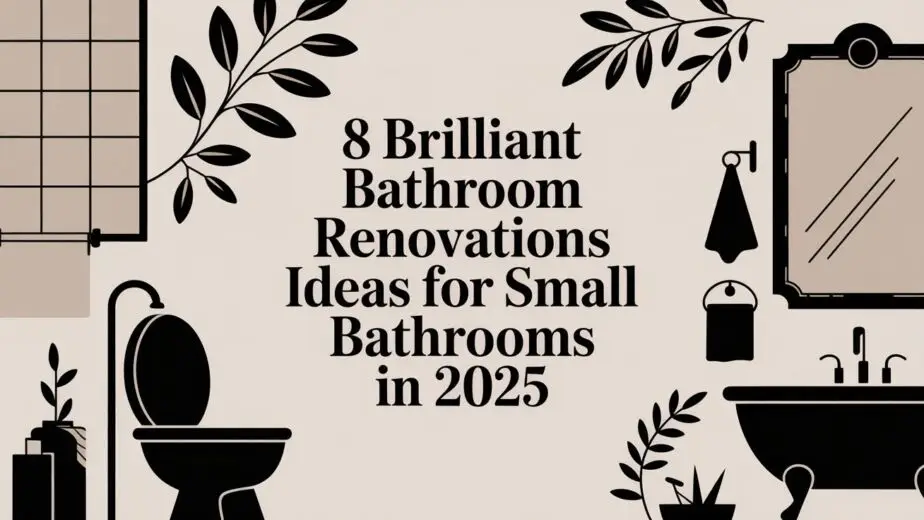
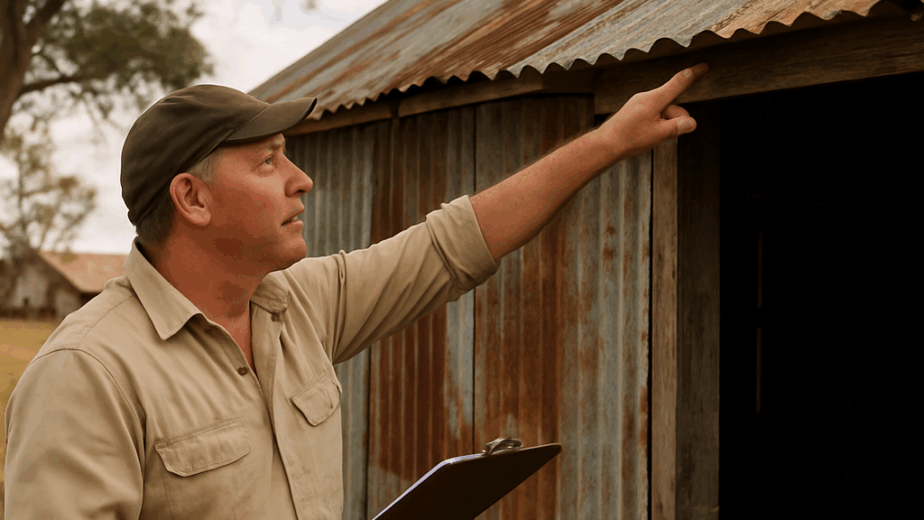
1 Comment